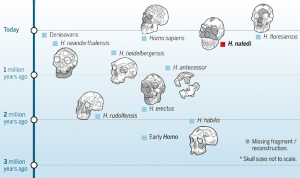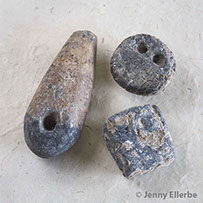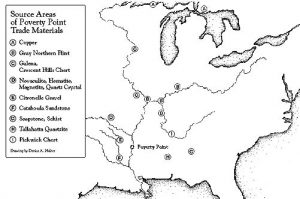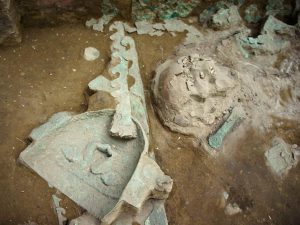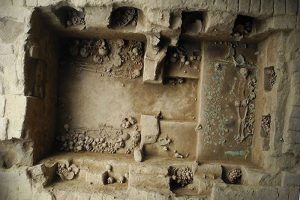In 2013, a deep, at some points very narrow cave system called Rising Star in South Africa produced bones that would be identified as a new addition to the Homo genus, named Homo naledi. The over 1,500 bones found, belonging to at least 15 individuals of varying ages, shared many traits with ourselves, such as the structure of their hands, wrists and feet, while also having many stark differences, including a much smaller brain that is closer to the Homo habilis (Hendry 2018). This mix of primitive and more modern features is curious, by not that surprising by itself, considering how complex the family tree is and how different members of the genus evolved in different ways.
The more surprising aspect of Homo naledi discovery is the age and location of the bones. To date the remains, the archaeologists who discovered the chamber first used radiometric dating on the flowstones, calcite deposited on the bones by running water that must have covered them at some point, and found that they were around 236,000 years old, meaning that the remains had to be older than that. After finding the minimum age, the team found the other end of the range by looking at how the cave’s natural radioactivity had affected the Homo naledi’s teeth by using electron spin resonance dating and estimated the maximum age to be around 335,000 years old (Greshko 2017). This dating makes the more primitive traits much more surprising because it means they were alive much closer to the time of Homo Sapiens than other members with similar brain sizes that lived millions of years ago (Figure 1), magnifying the complexity of the human’s already complicated evolution because it rejects the idea that brains have strictly gotten bigger and bigger as time has passed.
The placement of the bones was also puzzling considering the cave to get to the two chambers that were found is almost impossible to traverse, the chute (Figure 2) getting as narrow as 18 centimeters wide.
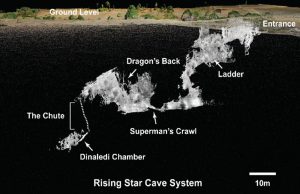
A cross section of the Rising Star cave system, showing the pathway that leads to the chamber that had most of the Homo naledi bones.
This brings up the question of why these individuals were brought into the cave system. A lack of marks on the bones and animal bones suggests that they were not dragged into the cave by any other animal (Zhang 2017), their own kind had most likely moved them. This kind of treatment of the dead is strange behavior for creatures with their smaller brains. While other animals today acknowledge their dead, navigating a complicated cave system, and probably having to use fire to do so (Hendry 2018), suggests a higher level of cognition and culture.
References
Greshko, Michael. “Naledi Fossils.” National Geographic, 9 May 2018, https://news.nationalgeographic.com/2017/05/homo-naledi-human-evolution-science/.
Hendry, Lisa. “Homo naledi, your most recently discovered human relative.” The Natural History Museum, 5 September 2018, http://www.nhm.ac.uk/discover/homo-naledi-your-most-recently-discovered-human-relative.html
Zhang, Sarah. “A New Addition to the Human Family Tree is Surprisingly Young.” The Atlantic, 9 May 2017, https://www.theatlantic.com/science/archive/2017/05/homo-naledi-age/525825/.
Images
https://medium.com/@johnhawks/renewed-excavations-in-the-rising-star-cave-ecb806f816d4
Additional Readings
https://daily.jstor.org/homo-naledi-and-paradigm-shift/.

